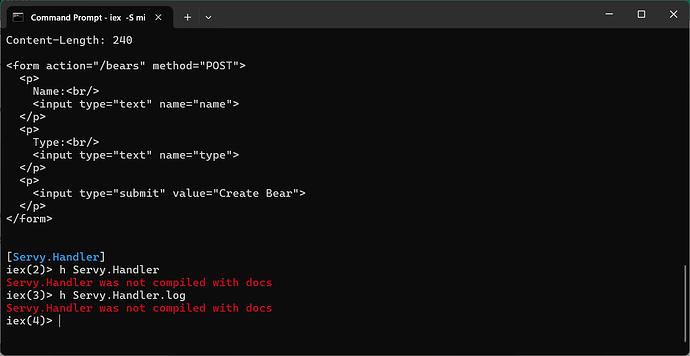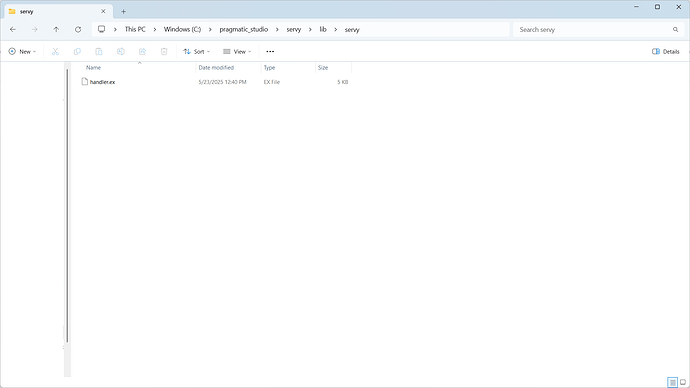I am currently enrolled in the Pragmatic Studio Elixir & OTP course and have just completed the section on module attributes. I have the following code:
defmodule Servy.Handler do
@moduledoc "Handles HTTP requests"
@pages_path Path.expand("../../pages", __DIR__)
@doc "Transforms the request into a response."
def handle(request) do
request
|> parse
|> rewrite_path
|> log
|> route
|> track
|> format_response
end
def emojify(%{status: 200} = conv) do
body = ":) " <> conv.resp_body <> " :)"
%{conv | resp_body: body}
end
def emojify(conv), do: conv
def track(%{status: 404, path: path} = conv) do
IO.puts("Warning: #{path} is on the loose!")
conv
end
@doc "Logs 404 requests"
def track(conv), do: conv
def rewrite_path(%{path: "/wildlife"} = conv) do
%{conv | path: "/wildthings"}
end
def rewrite_path(%{path: "/bears?id=" <> id} = conv) do
%{conv | path: "/bears/#{id}"}
end
def rewrite_path(conv), do: conv
def log(conv), do: IO.inspect(conv)
def parse(request) do
# TODO Parse the request string into a map
[method, path, _] =
request
|> String.split("\n")
|> List.first()
|> String.split(" ")
%{method: method, path: path, resp_body: "", status: nil}
end
def route(%{method: "GET", path: "/wildthings"} = conv) do
%{conv | status: 200, resp_body: "Bears, Lions, Tigers"}
end
def route(%{method: "GET", path: "/bears"} = conv) do
%{conv | status: 200, resp_body: "Teddy, Smokey, Paddington"}
end
def route(%{method: "GET", path: "/bears/new"} = conv) do
@pages_path
|> Path.join("form.html")
|> File.read()
|> handle_file(conv)
end
def route(%{method: "GET", path: "/bears/" <> id} = conv) do
%{conv | status: 200, resp_body: "Bear #{id}"}
end
def route(%{method: "GET", path: "/pages/" <> file} = conv) do
Path.expand("../../pages", __DIR__)
|> Path.join(file <> ".html")
|> File.read()
|> handle_file(conv)
end
def route(%{method: "GET", path: "/about"} = conv) do
Path.expand("../../pages", __DIR__)
|> Path.join("about.html")
|> File.read()
|> handle_file(conv)
end
def route(%{method: "DELETE", path: "/bears/" <> _id} = conv) do
%{conv | status: 403, resp_body: "Deleting a bear is forbidden!"}
end
def route(%{path: path} = conv) do
%{conv | status: 404, resp_body: "No #{path} here"}
end
def handle_file({:ok, content}, conv) do
%{conv | status: 200, resp_body: content}
end
def handle_file({:error, :enoent}, conv) do
%{conv | status: 404, resp_body: "File not found"}
end
def handle_file({:error, reason}, conv) do
%{conv | status: 500, resp_body: "File Error: #{reason}"}
end
def format_response(conv) do
# TODO: Use values in the map to create an HTTP response string:
"""
HTTP/1.1 #{conv.status} #{status_reason(conv.status)}
Content-Type: text/html
Content-Length: #{byte_size(conv.resp_body)}
#{conv.resp_body}
"""
end
defp status_reason(code) do
%{
200 => "OK",
201 => "Created",
401 => "Unauthorized",
403 => "Forbidden",
404 => "Not Found",
500 => "Internal Server Error"
}[code]
end
end
request = """
GET /wildthings HTTP/1.1
Host: example.com
User-Agent: ExampleBrowser/1.0
Accept: */*
"""
response = Servy.Handler.handle(request)
IO.puts(response)
request = """
GET /bears HTTP/1.1
Host: example.com
User-Agent: ExampleBrowser/1.0
Accept: */*
"""
response = Servy.Handler.handle(request)
IO.puts(response)
request = """
GET /bigfoot HTTP/1.1
Host: example.com
User-Agent: ExampleBrowser/1.0
Accept: */*
"""
response = Servy.Handler.handle(request)
IO.puts(response)
request = """
GET /bears/1 HTTP/1.1
Host: example.com
User-Agent: ExampleBrowser/1.0
Accept: */*
"""
response = Servy.Handler.handle(request)
IO.puts(response)
request = """
GET /wildlife HTTP/1.1
Host: example.com
User-Agent: ExampleBrowser/1.0
Accept: */*
"""
response = Servy.Handler.handle(request)
IO.puts(response)
request = """
GET /bears?id=1 HTTP/1.1
Host: example.com
User-Agent: ExampleBrowser/1.0
Accept: */*
"""
response = Servy.Handler.handle(request)
IO.puts(response)
request = """
GET /about HTTP/1.1
Host: example.com
User-Agent: ExampleBrowser/1.0
Accept: */*
"""
response = Servy.Handler.handle(request)
IO.puts(response)
request = """
GET /bears/new HTTP/1.1
Host: example.com
User-Agent: ExampleBrowser/1.0
Accept: */*
"""
response = Servy.Handler.handle(request)
IO.puts(response)
However, when I try to see the generated documentation as an exercise, I get an error:
Any ideas?




















